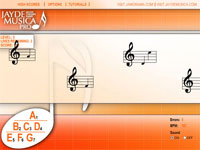Piano Lessons and the Importance of Learning Chords and Music Theory
>> Dont Even Think Of Trying Other Prodicts untill You Read This <<
To truly learn to play the piano well, piano lessons and a proper instructor are of utmost importance. Sure, there have been many great self-taught piano players throughout the history of the piano, but even the most naturally gifted piano players know the benefits of having a good mentor can result in a much quicker and more well-rounded learning process for the average beginning pianist. When I say "much quicker," I do not mean that a qualified piano instructor will magically turn you into a concert pianist in a week?s time, because it takes years to truly reach an advanced level of piano playing, even for the gifted students. The reason that proper piano instruction is vital to the learning process is that it enables the piano student to learn proper piano playing techniques from a qualified source and gives the student an additional perspective rather than being only self-taught.
Of course, the styles of each piano instructor you meet may vary, but their teaching should always cover the same five basic topics: fingering and posture, reading music, scales, technique, and sight reading. The proper fingering and posture should be taught earliest, due to the importance of a piano student knowing how to their hands and where to place them on the piano keys. The basis of this area of study should be repetitive practicing of scales. Soon after, the piano student should start learning how to read music notation beginning with the very simplest notes, key signatures and time signatures before moving on to more advanced ideas.
Piano teachers introduce most of these ideas into the piano lessons at the same time the student is learning to read music notation. Learning to read music is an area of practice that will continue throughout the full course of learning to play the piano. A piano teacher will usually begin a student with easy musical pieces to start off with, and gradually increase the difficulty level and introduce the piano student to more advanced assignments. After the student is adequately knowledgeable in reading music, a piano teacher might introduce the student to Sight Reading, which is the term used for playing a piece of piano music without having seen it before.
Another detail of properly learning to play the piano is studying and practicing music theory and chords. Chords and music theory are extremely valuable aspects of a pianist's learning process. When learning to read music, a beginning piano player should be taught to understand the theory behind the music, rather than simply relying on sheet music. There may be instances in a pianist's life in which he or she will have to perform without the aid of sheet music, and this is where the value of knowing chords and music theory kicks in. Unfortunately, many piano instructors seem to leave this factor out of their piano lesson plans, but with chords and music theory mixed in with all other quality piano instruction, the beginning piano player begins to grow as a pianist since all of the elements of instruction are working together. Learning to play the piano then becomes simply gaining knowledge gradually over time, and it only gets easier and more enjoyable!
Todd Bridges is a life-long music fan and piano lover. His website is at http://www.perfect-piano.com. Other than standard piano lessons, Mr. Bridges is a supporter of the educational and entertaining Piano Wizard software for learning how to play the piano.
Labels: chord_learn_music_piano_piano_play_presto_read, frog_leap_learn_piano_see, learn_piano_play_song, learn_to_play_blues_piano

